MercoPress. South Atlantic News Agency
Argentine farmers hold on to their crops waiting for electoral promises, but 'dry' central bank reserves
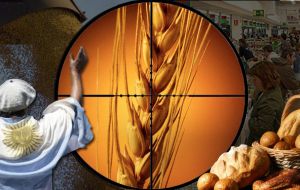 Cereal exports last week fell 68.5% in terms of a yearly comparison, reaching only US$192 million, far below the normal weekly average.
Cereal exports last week fell 68.5% in terms of a yearly comparison, reaching only US$192 million, far below the normal weekly average. 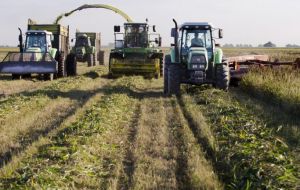 The consensus among farmers is that the sector will benefit from better incentives in 2016, making profits soar.
The consensus among farmers is that the sector will benefit from better incentives in 2016, making profits soar. 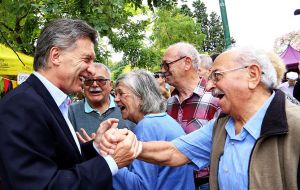 Macri has promised to end the restrictions on the dollar trade in the first day of his potential presidency, making exports even more profitable.
Macri has promised to end the restrictions on the dollar trade in the first day of his potential presidency, making exports even more profitable. 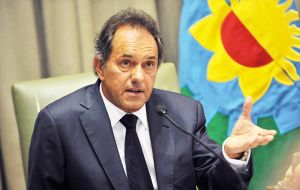 Scioli opposes any strong devaluation of the Peso and says he will only end the restrictions on the dollar trade “gradually.”
Scioli opposes any strong devaluation of the Peso and says he will only end the restrictions on the dollar trade “gradually.” 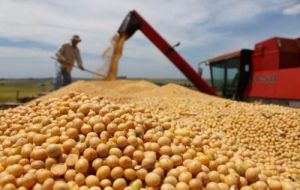 Macri was also the first candidate to promise a reduction of five percentage points per year in export duties on soybean.
Macri was also the first candidate to promise a reduction of five percentage points per year in export duties on soybean. Argentina's election season has dramatically changed the agricultural landscape in the country, one of the world's breadbaskets. Exporters are now more confident than ever that profits will soar next year, creating a short term impact of plunging sales abroad and reduced cash-flow in the Argentine Central Bank’s coffers, although that could change in 2016.
A report from the CIARA-CEC (Cooking Oil Chamber and Cereal Exporters Chamber) grain exporting chambers said that last week was the worst of the year in terms of dollars brought into Argentina, as the sector’s businessmen see holding onto grain as the most profitable course of action ahead of economic reforms that may include a devaluation of the Peso and lower taxes for the sector.
Exports last week fell 68.5% in terms of a yearly comparison, reaching only US$192 million, far below the normal weekly average. The only comparable period in terms of sales came in mid-February, when 180 million was brought in over a short, three-day working week amid Carnival celebrations.
February is usually a weak month in terms of sales, as the first quarter of every year sees little to no soy bean exports due to seasonal reasons.
Last week’s result was comparable to the worst week of that first quarter. Although, output was already expected to fall for 2016, reports from the ground say sowing has somewhat recovered in the late stages of 2015, which might help 2016’s harvest from falling after all.
The consensus among farmers is that the sector will benefit from better incentives in 2016, making profits soar.
The two remaining candidates in the presidential race, Let’s Change’s Mauricio Macri and Victory Front (FPV)’s Daniel Scioli, view the sector as crucial for obtaining the dollars necessary to exit the so-called “clamp” on foreign currency trade, promising the end of export duties on corn and wheat as well as lifting export quotas.
Macri, however, is favored much more by the sector, as he has also promised to end the restrictions on the dollar trade in the first day of his potential presidency, a move that could bring the official dollar price quickly upwards, making exports even more profitable.
Scioli, on the other hand, has said he opposed any strong devaluation and says he will only end the restrictions on the dollar trade “gradually.” Shock reforms and strong devaluations would put the burden of macroeconomic reforms on the shoulders of wage-earners, Scioli’s advisers argue.
Macri was also the first candidate to promise a reduction of five percentage points per year in export duties on soybean. Other candidates had doubts about the viability of reducing that levy, as it could cost the state’s coffers too much in missing income.
Macri’s surprisingly strong showing in the presidential election’s first round on October 25, forcing a runoff with Scioli after coming only three points behind him, meant that expectations in the sector rose higher than they were last week.
A large part of Macri’s support came from the country’s richest rural districts in the provinces of Buenos Aires, Córdoba and Santa Fe .




Top Comments
Disclaimer & comment rules-

-

-

Read all commentsIsn't the problem that the current Argentinian government has so screwed up the economy that they have had to put in place draconian laws restricting dollar ownership.
Nov 05th, 2015 - 10:51 am 0I know of no democratic country in the world where you are forbidden from owning money in whichever currency YOU choose.
I'm currently have funds in Euros, NZ$, OZ$ and US$. For trips I will be taking.
Some of those trips will be in excess of a moth so I hold over £1000 in each foreign currency.
@ 1 zathras
Nov 05th, 2015 - 11:06 am 0But what does the 'moth' (polilla) think about it? :o)
@1 I do much the same….I like to arrive in a country with some cash, especially small notes for tipping. I don't usually carry that much unless I am going to Argentina.
Nov 05th, 2015 - 12:34 pm 0Commenting for this story is now closed.
If you have a Facebook account, become a fan and comment on our Facebook Page!